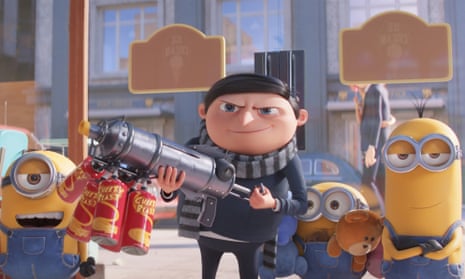Censors in China have changed the ending of the animated film Minions: The Rise of Gru for its domestic release, according to viewers in the country, in yet another example of China altering a popular Hollywood film.
According to posts and screenshots of the film, shared on Weibo, a platform similar to Twitter, there is an addendum by censors showing that Wild Knuckles, a main character in the heist film, was caught by police and served 20 years in jail.
It also states Gru, a co-conspirator of Wild Knuckles, “returned to his family” and “his biggest accomplishment is being the father to his three girls”.
In the international version, the film ends with Gru and Wild Knuckles riding off together after the latter faked his own death to evade capture.
Numerous online commentators mocked the edits, saying they resembled a PowerPoint presentation.
DuSir, a film review publisher with 14.4 million followers on Weibo, noted that the Chinese version ran one minute longer than the international one, and questioned why the extra time was needed.
“It’s only us who need special guidance and care for fear that a cartoon will ‘corrupt’ us,” DuSir wrote.
Huaxia Film Distribution and China Film Co, the film’s distributors in China, did not respond to a request for comment.
China has placed a limit on the number of overseas films that can be shown in domestic cinemas. Many Hollywood films that screen in the country have certain scenes omitted or altered.
after newsletter promotion
This year, Chinese viewers of the 1999 film Fight Club noticed that the original ending, in which the protagonist and his alter ego blow up some skyscrapers, was not in the version shown on the domestic streaming site Tencent Video.
Instead, an on-screen script said police “rapidly figured out the whole plan and arrested all criminals, successfully preventing the bomb from exploding”.
The changes were widely mocked and even elicited responses from the film’s director and the author of the novel on which it was based. Tencent later restored the original ending.








